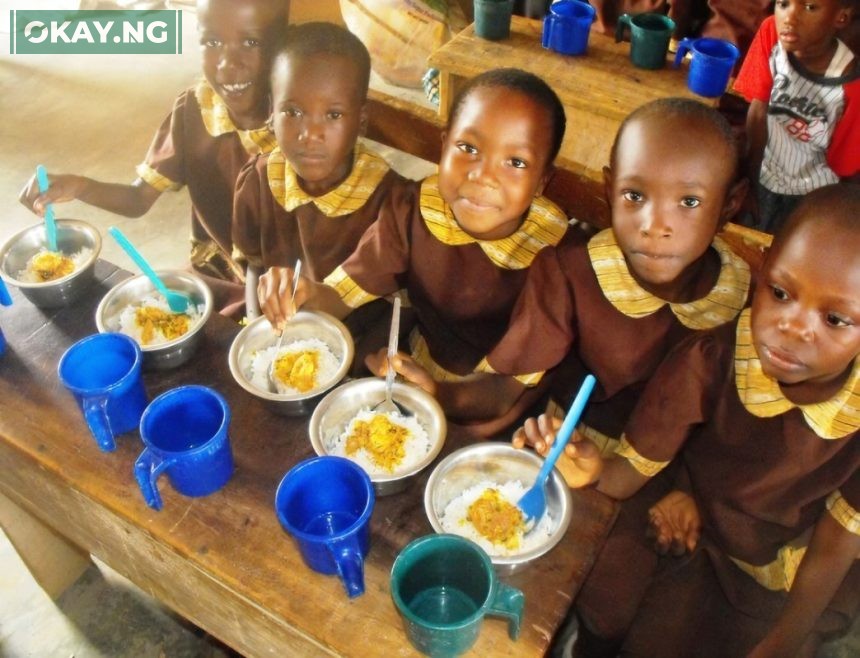To combat child hunger and bolster educational outcomes, the Federal Government has finalized plans to relaunch its Renewed Hope National Home-Grown School Feeding Programme (RH-NHGSFP) on May 29, 2025. The announcement, made by the Minister of State for Humanitarian Affairs and Poverty Reduction, Dr Yusuf Sununu, during a meeting with key stakeholders in Abuja on Wednesday, April 23, 2025, signals a renewed commitment to social welfare amidst past challenges.
The relaunch, strategically timed to coincide with President Bola Tinubu’s second year in office, comes against a backdrop of previous controversies and allegations of fraud that had plagued the earlier iterations of the programme. Speaking with conviction, Dr Sununu emphasized the programme’s core objectives: to “combat child hunger and improve educational outcomes across the country.” He elaborated on its comprehensive design, highlighting the provision of daily nutritious meals prepared with locally sourced ingredients, a dual approach intended to nurture children’s health and invigorate local agricultural communities.
The government projects ambitious yet crucial targets for the revitalized initiative. Dr Sununu stated that the programme aims to reach an impressive 10 million children, with the potential to significantly impact the education sector by increasing school enrollment by an estimated 20% and academic performance by 15% by the end of 2025. “Our mission is to feed every public school pupil in Primary One to Three, nurturing their potential and building the nation’s future,” he asserted, underscoring the long-term vision of the programme. Beyond immediate nutritional needs, the RH-NHGSFP is designed to reduce malnutrition, improve school retention rates, and contribute meaningfully to the nation’s overall development.
Dr Sununu passionately called for community ownership and active parental involvement to ensure the programme’s success. He also highlighted the crucial role of training for cooks and acknowledged the programme’s potential to empower women and smallholder farmers within the local food supply chain. Assurances of robust reforms, enhanced monitoring mechanisms, and stronger collaborations were given to guarantee the programme’s sustainability and measurable impact on the lives of Nigerian children.
Read Also: Nigeria Confronts Alarming Juvenile Detention Crisis: 26,000 Children Behind Bars
Echoing this sentiment, the National Programme Manager of RH-NHGSFP, Dr Aderemi Adebowale, described the initiative as “an investment in the nation’s future,” emphasizing that its objectives extend beyond mere feeding. “Our aim also includes empowering women, youth, and farmers through inclusive and sustainable practices,” she explained. This holistic approach recognizes the interconnectedness of nutrition, education, and economic empowerment within communities.
Dr Adebowale revealed a significant financial commitment to the programme, with N100 billion allocated in the 2025 budget to facilitate its scaling and deepen its impact at the community level. A key feature of the revamped RH-NHGSFP is its commitment to transparency and accountability. Dr Adebowale announced the implementation of “new QR-coded supply chains and real-time tracking for better transparency, quality control, and accountability.” This technological integration aims to address past concerns regarding the programme’s integrity and ensure that resources are utilized effectively.
Furthermore, the programme will prioritize the full integration of women, youth, cooks, and farmers, offering them targeted training and income-generating opportunities. “Nutritionists, health professionals, and supervisors will monitor food quality and assess pupil health and programme outcomes,” Dr Adebowale stated, emphasizing the focus on data-driven evaluation. A core tenet of the renewed programme is its commitment to local sourcing, particularly through women-led cooperatives, with the ambitious goal of reducing rural poverty by 40%.
In a significant step towards ensuring accurate beneficiary identification and tracking, Dr Adebowale announced a collaboration with the National Identity Management Commission (NIMC) to register all beneficiaries. This measure is crucial for maintaining the integrity of the programme and ensuring that aid reaches those who need it most.
The relaunch of the National Home-Grown School Feeding Programme represents a significant undertaking by the Federal Government, carrying the hopes of millions of Nigerian children and the potential for transformative impact on communities nationwide. As the May 29th launch date approaches, stakeholders and citizens alike will be keenly watching to see how these ambitious plans translate into tangible improvements in the lives of the nation’s most vulnerable.












